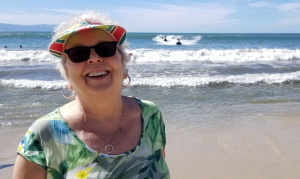

I am a six year survivor of stage III B ovarian cancer. My cancer is incurable, my treatment palliative (prevention of disease progression). Following surgery in December 2014, I started on dose dense chemotherapy (you get a lot of chemotherapy in a short period of time!) with first line treatment, taxol and carboplatin. I recurred in April 2019 and was treated again with the same drugs. Even though my cancer mainly remitted, I continued to have evidence of disease with small spots on my liver and abdominal wall. I then went on a targeted therapy, Avastin infusions, for six months. Targeted therapy is just that – drugs that attack the cancer cells without affecting normal cells. Avastin reduces a tumor’s ability to grow new blood vessels. Again, while my cancer did not remit, it did not progress either. After six months, my kidney function became compromised. In December 2019, I went on another targeted therapy, Lynparza, a PARP Inhibitor that repairs damaged cellular DNA. Taking four pills a day, my main side effects are fatigue and shortness of breath. CT scans since February 2020 have shown no evidence of disease. Lynparza is working!
I am fortunate that I have had no treatment complications and I am treatment responsive. Both chemotherapies were hard on me, physically and psychologically. Both times, at the end of treatment, I felt more dead than alive. It took a few months, but I perked up and became myself again. I have been in a GYN Cancer Survivor Group for five years. Even though it is for women with all GYN cancers, it turns out that mostly women with ovarian cancer attend the group. I lost two teal sisters in July. For those of you who have participated in a group over time, you know how close you become — survivor friendships. In my support group, I talk about my heartbreak and fears about dying. Dealing with loss and grief when a teal sister dies is very hard. I mourn. I am anxious. People sometimes ask me why I go to the group. Even though it hurts to talk about loss, it helps me more than hurts me. So I go. We celebrate our survivorship and it eases my way.
Sometimes it is hard for me to listen to survivors who have recovered and are considered cured when I know that this will probably not be my disease course. While I have been and am currently treatment responsive, there will come a time when I will probably become treatment resistant. I try and make each day count, but it is sometimes hard to do as it keeps my prognosis front and center in my mind. So in reality, on a day to day basis, I forget I have ovarian cancer and live like I don’t! To this end, I have continued with active community volunteer work, staying close to friends — some of whom have ovarian cancer and some who do not, gardening, reading and traveling. I am a non-athletic, slightly overweight 73 year old who incorporates a variety of exercise into her life. I am currently learning pickle ball and do yoga/strength conditioning several times a week. I line dance and swim. When the weather is nice I walk and hike. I am not an expert at any of these activities but find that any movement is the best antidote for cancer-related fatigue and depression. So ladies — JUST MOVE!
The fullness of my life enables me to manage my anxiety and, yes, to be mostly content. I do not dwell on my prognosis. I do not identify myself as an incurable cancer patient. I always have something to look forward to. For example, I recently planted 150 tulip and daffodil bulbs in my garden. I cannot wait for spring when they begin to pop their little heads above the dirt and quickly and beautifully bloom – always followed by a delightful spring and summer garden. Looking at my winter garden, I happily anticipate this blooming and I am happy when it happens. So I mightily hold on to these experiences of happiness. It helps me!
I am grateful to my hardworking stellar oncologists and other cancer support persons who are traveling with me – celebrating my continued remission on this sometimes perilous journey. And should my disease progress, I know that they will reach into their cancer toolbox and find another treatment making it possible to extend my life as much as possible.
While I try and keep up on the literature, I do not become too intellectually attached to this research. When I do read the literature, inevitably the first paragraph cites the dismal mortality statistics for this disease. But statistics are just that — numbers that concern group populations and not individual persons. But researchers and clinicians also speak to the amazing advances being made at a cellular level in the treatment of ovarian cancer. They are optimistic and excited, and that makes me feel the same.
Finally, hearing stories from my fellow survivors inspires me in a wonderfully hopeful way. Hope is my north star. I want it to be yours too. In closing, I share with you one of my most favorite poems by Emily Dickinson:
“Hope” is the thing with feathers —
That perches in the soul —
And sings the tune without the words —
And never stops — at all —
Poet Dickinson is saying that hope comforts us and keeps us from succumbing to the sometimes brutal, turbulent and complex challenges of life. Hope is like the “free spirit of a bird.” Ladies…I choose hope. I want you to choose hope too.
